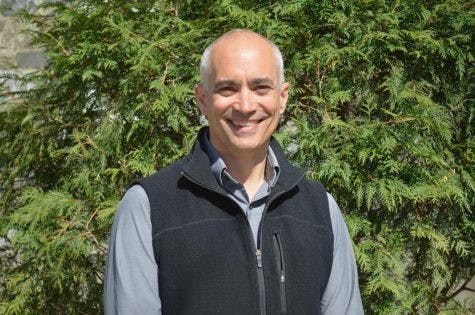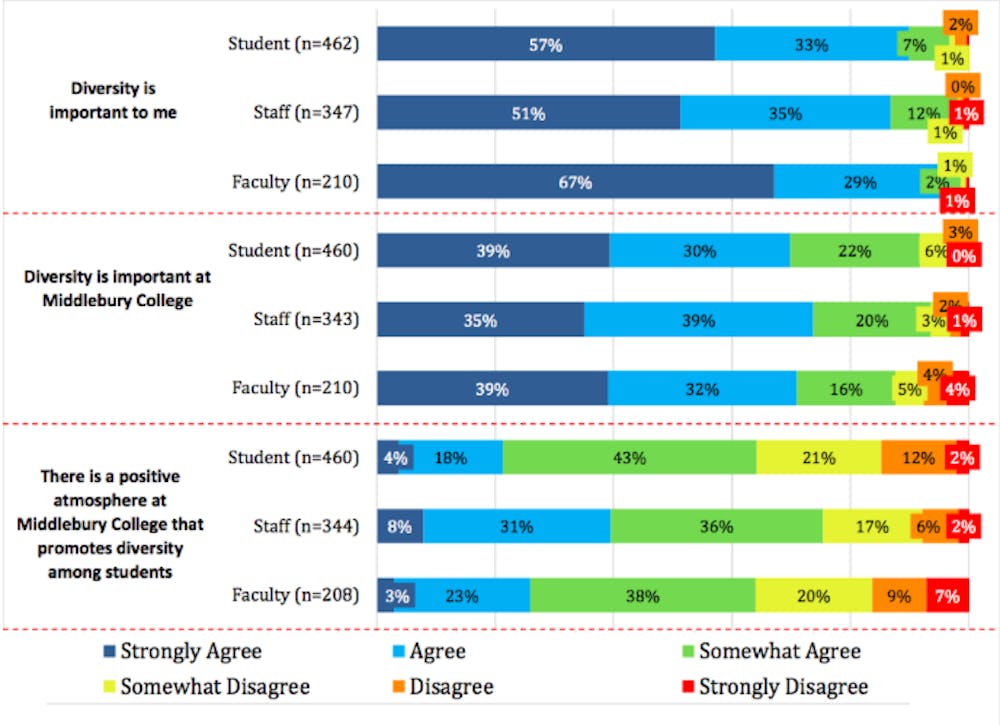The Office of Diversity, Equity and Inclusion will release the findings of a yearlong “campus climate assessment” tomorrow. The assessment reviews student, faculty and staff perceptions of diversity, inclusion and other facets of life at Middlebury. In addition to painting an image of dissatisfaction with realities of diversity and inclusion on campus, the 89-page report contains a set of “actionable recommendations” that will serve as cornerstones of a strategic three-to-five year plan to improve campus equity.
The report is the product of interviews with small focus groups and two campus-wide surveys. The study was conducted over the past year by the Washington Consulting Group (WCG), a firm based in Bethesda, MD the college has previously used to conduct campus assessments. WCG remained in contact with the Office of Diversity, Equity and Inclusion along the way.
This report is part of a fairly regular cycle at Middlebury. Campus climate surveys have surfaced roughly every six years over the past two decades, according to Chief Diversity Officer Miguel Fernandez, and they’re usually triggered by a major event like Charles Murray’s visit two years ago.
The 2019 Campus Climate Assessment reflects tensions that have arisen in conversations at Middlebury since Murray visited campus: it paints a picture of a campus that has a long way to go before becoming an equitable space for students, faculty and staff.
In writing the report, WCG sought reactions from those three groups about the state of campus life across six categories: diversity, inclusion, campus accessibility, harassment and bullying, employment practices and meaningful interactions.
The climate assessment was conducted in three phases. First, WCG collected qualitative data last spring from faculty and staff “focus groups” – small groups organized by “social identity” like ethnicity, gender and sexual orientation. Second, students were brought into focus groups that fall. Focus groups were small, ranging in size from two (the female students focus group) to 12 (female staff). While the focus groups’ small size limited their effectiveness as indicators of campus-wide sentiment, there were also benefits to kicking off the assessment by speaking with smaller groups.
“Sometimes that small size was very effective, because the folks running those groups were able to dig deep,” Fernandez said.
Third, campus-wide surveys were sent out last fall that asked students, faculty and staff questions similar to those posed to focus groups. Fernandez said that since the focus groups were small, more data was needed, and the campus-wide surveys gave all members of the community the opportunity to contribute to the climate assessment.
“Regarding completion rate, 617 students viewed the survey, 398 completed all of the questions and 111 started but did not answer all of the questions,” the report reads. “For the faculty and staff survey, 1010 respondents viewed the survey, 531 completed all of the questions, 145 started but did not answer all of the questions.”
Both surveys asked questions pertaining to “perceptions and experiences of diversity and inclusion, meaningful interactions with individuals of varying socioeconomic status; harassment; bullying and intimidation; physical accessibility; and disability,” according to the report. The staff and faculty survey asked questions about tenure, promotion and annual review process in addition to diversity and inclusion-oriented questions posed in the student survey.
Survey respondents and focus group participants were asked to agree or disagree with statements like “diversity is important to me” and “diversity is important to Middlebury College” on a scale from “strongly agree” to “strongly disagree.” In the first section of the report, which showcases responses to questions pertaining to diversity, participants largely agreed with the statement “diversity is important to me.”
While survey participants generally agreed with the statement “diversity is important to Middlebury College,” with 39% of respondents strongly agreeing with that statement, few participants agreed with the statement “there is a positive atmosphere at Middlebury College that promotes diversity among students” – just 4% of students, 8% of staff and 3% of faculty agreed strongly with that statement.
Survey and focus group results also convey dissatisfaction with Middlebury’s inclusiveness. 48% of students responded “slightly dissatisfied” to the statement “Middlebury College is inclusive for students.” White students and students of color responded with striking difference to the statement “Middlebury College is inclusive for students who share my race/ethnicity”: 79% of white students strongly agreed with that statement, compared to just 9% of students of color.
One of the most notable points in the report came in the harassment, bullying and intimidation category, where Fernandez was surprised by how far-reaching the effects of harassment are on campus.
“The statement ‘Middlebury is free of harassment,’ a huge amount of faculty, staff and students disagree with that,” Fernandez said. “Same with bullying and same with intimidation. That was an eye-opener for us, seeing how many people felt that across all groupings. It wasn’t just people from minority groups.”
Data surrounding perceptions of campus accessibility, too, illustrate frustration with accomodations in dining halls, campus housing, computer labs, athletic facilities and classroom buildings.

Chief Diversity Officer Miguel Fernandez said that the strategic plan, based off the recommendations from the 2019 report, will take three to five years to implement in full.
According to Fernandez, who heads the Office of Diversity, Equity and Inclusion, the report will serve as much more than a helpful indicator of how community members feel about some of the divisive issues raised in the wake of Murray’s visit in the spring of 2017. It will be used as a cornerstone of a new strategic plan that Fernandez’s office is working on as a way to affect tangible change in the areas that the 2019 report identifies as frustrations for many members of the Middlebury community.
The strategic plan, which Fernandez said will take three-to-five years to implement in full, will draw upon “actionable recommendations” included at the end of the 2019 report. The Office of Diversity, Equity and Inclusion will begin work on the strategic plan this summer, and will work with community stakeholders into the fall before presenting the plan by the end of 2019. One of the ways the report recommends changing campus culture is continued education for students around diversity, equity and inclusion, which Fernandez’s office has worked to promote with Director of Education for Equity and Inclusion, Renee Wells.
“Building on education around diversity, equity and inclusion is an actionable step that we believe will have a real effect on campus culture,” Fernandez said.
Fernandez also plans to listen closely to student concerns as the strategic plan is rolled out. A recent student campaign to diversify and decolonize college curricula is an example of a student group whose input the Office of Diversity, Equity and Inclusion hopes to hear as the plan gathers steam this fall.
“It’s important to keep in mind that student concerns change rapidly,” Fernandez said, adding that his office should be held accountable for keeping a finger on the pulse of campus opinion as the action plan is written and rolled out.
“We’re talking about decolonizing curricula right now, but that conversation could evolve drastically in three to five years, and we want to take that into account,” Fernandez said.
Major Study of Inclusion on Campus Drops Tomorrow

BENJY RENTON/THE MIDDLEBURY CAMPUS
Comments



